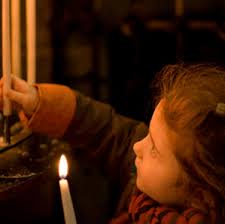The same events that make the season fun and festive for kids – visiting family, lighting candles, and receiving toys, for example, can cause mishaps. Fortunately, most such problems are preventable – but only with forethought.
Here is what you should know:
1. Vaccinate infants and young children for influenza.
Family gatherings tend to bring together people of all ages and from different communities and place them in close contact with each other, with much hugging and kissing, all ideal for spreading flu-type viruses.This year the CDC recommends that everyone 6 months and older get vaccinated for the flu.
2. Leave children home when they are sick.
If your child is already sick with a respiratory infection, the best gift you can give your friends and family is to keep your child at home. Assume that children with bad coughs and runny noses are contagious to others. Children with respiratory infections need not be kept indoors. Fresh air is fine.
3. Carry your children’s medications and the telephone numbers of their health care providers.
Illness knows no holiday. Medications may be difficult to obtain on holidays.
4. Scan houses for hazards when you go visiting.
The incidence of accidents and poisonings tends to increase when visiting other homes, especially during the holidays. Mistletoe and holly berries cause intestinal upsets when ingested. Many Christmas tree ornaments are fragile and break easily, and the pieces can be ingested, causing cuts in the mouth. The hooks that suspend tree ornaments have also been responsible for cuts.
5. Appoint a designated “toddler watcher.”
Everyone wants to hold and play with infants and young children. But when “everyone” watches them, often no one is actually in charge, and toddlers may wander off. When you are not overseeing your child yourself, make sure that someone responsible is, and that they personally return the child to you.
6. Never leave small children unattended near candles.
Many festive observances involve candles. Candles fascinate children. Candles cause more than 11,000 fires each year, a disproportionate number of them around holiday time, and 1200 injuries and 150 deaths annually, says the U.S. Consumer Product Safety Commission. Place candles in safe places and where children can’t reach them.
7. Check toys given to your children.
Well-meaning friends and relatives often bring toys that are age-inappropriate with sharp edges or small pieces that can easily break off. Other toys may have been brought from overseas and bypassed safety inspections or may be old and were made before regulations existed.
 8. Dress children in warm clothing even for short car rides.
8. Dress children in warm clothing even for short car rides.Yes, you are just going from one house to another in a heated car. But cars can break down or end up in snow banks on lonely roads. Children become hypothermic very rapidly.
9. Know your child’s tolerance for socializing.
Some young children love being the center of attention and thrive on being passed from adult to adult. Others do not enjoy it – and become irritable and then irritating to others. For these children, a period alone with you in another room enjoying a quiet activity will make everyone feel better.
10. Discard prepared food left standing at room temperature for 2 hours.
 Hosts of holiday meals are often inexperienced at preparing and serving food for large groups, occasionally resulting in food poisoning, says the U.S. Department of Agriculture. Buffets are especially popular at holiday time, with people coming and going. Young children and the elderly tend to have more severe cases of food poisoning.
Hosts of holiday meals are often inexperienced at preparing and serving food for large groups, occasionally resulting in food poisoning, says the U.S. Department of Agriculture. Buffets are especially popular at holiday time, with people coming and going. Young children and the elderly tend to have more severe cases of food poisoning.Thanks to kidstraveldoc.com for the info for this post.





No comments:
Post a Comment